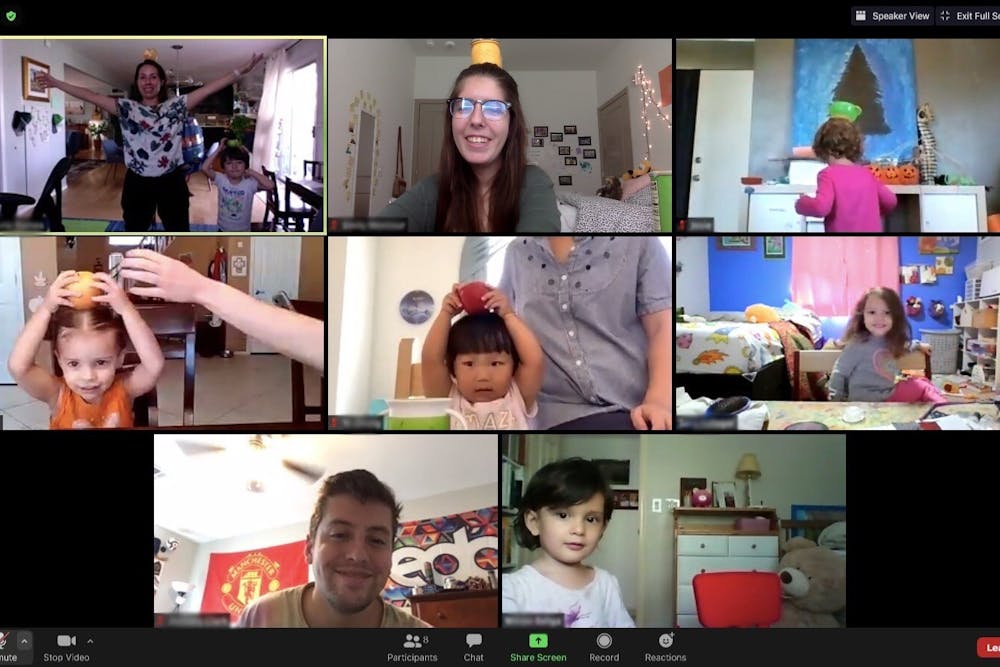ASU's Child Study Lab, a preschool community for children ages 15 months to 5 years, adapted and refined its remote curriculum and is working to resume research after months of halted projects due to the COVID-19 pandemic.
Anne Kupfer, the lab’s director, said the philosophy the lab uses in its curriculum sets them apart from a traditional child care center.
“We don't consider ourselves a day care,” Kupfer said. “We really like to consider ourselves a purely educational program, and that's why we're housed in the psychology department.”
This curriculum, referred to as a “self-regulation” curriculum, utilizes the theories of mind and embodied cognition. These theories combined inform the way the lab handles the assessment of children’s needs and development.
“Theory of mind refers to children’s understanding that people have their own desires, visual perspectives on things they see, thoughts and memories,” said William Fabricius, an associate professor who focuses on the theory of mind. “It takes children time, up to about age 7, to learn about these unseen things.”
Arthur Glenberg, a psychology professor who studies embodied cognition, said the theory is based on mirror neurons, which are neurons that produce physiological reactions from seeing someone else's actions.
“When I see you smile, I'm able to understand your smile in terms of my own ability to smile,” Glenberg said.
The lab uses this understanding to prioritize within their program. The adapted curriculum depends on three core tenets: a focus on academics, self-regulation and the treatment of all students as equally and highly gifted.
“Something that we're really excited about is that we have a formal self-regulation curriculum that we use with our older children that we're now adapted with our younger children," Kupfer said.
Socialization is extremely important to the lab’s methodology, and the curriculum has previously benefited from students being able to physically interact with instructors. The lab's approach toward education has changed drastically, with teachers and teaching assistants using physical exercise to maintain student's attention.
“We have children stand up, or we have them sit down, or even move around, so they're interacting with the teachers at all times," Kupfer said. "You have to maintain their attention, they're not going to sit there and stare at a computer.
"The secret to our curriculum is movement."
In order to maintain engagement remotely, teachers are limiting class sizes, as well as using the video communication software Zoom's breakout room function as a tool to communicate and interact with students on an individual basis.
“We're trying to improve the amount of time the children are actually interacting with another child. We still want to keep a session and the number of children to a smaller size because we want all the children to see each other on the screen,” Kupfer said. “We can use breakout rooms to problem solve with two children who are having an issue and talk through things individually."
Additionally, with field trips being canceled, the lab has started taking virtual trips to places around the world. The students have been improving their geography skills, exploring locales such as volcanoes and creating themed artwork afterward.
Kupfer said the process of moving from an in-person curriculum to a virtual version is difficult because the children aren't interacting with one another as much.
The Child Study Lab has also struggled with the administration of student assessments and opportunities for undergraduate research. Despite initial hopes that in-person research could resume by the end of October, the lab has had to make things work virtually once more.
The lab is working on refining their methodology for virtual studies. According to Kupfer, the studies they are planning on reinstating include an online version of their assessments and a research study on the theory of mind in conjunction with Fabricius.
Even with the current curriculum under development, there is some concern about the tenability of the situation, Kupfer said, pointing to the lack of in-person engagement.
Juliet Hart Barnett, an associate professor in the Mary Lou Fulton Teachers College and the mother of a child enrolled in the lab’s program, said Kupfer and her staff are working hard to continue to serve their students.
"There are challenges in securing and maintaining the attention of children," Barnett said in an email. "However, many students are able to engage with virtual learning because of the efforts of the educators as they select and deliver instruction that is both visually engaging and relevant to students’ experiences.”
Kupfer said her fellow teachers at the lab are to thank for the success they've had in their transition.
"My teachers just stepped up to the plate," Kupfer said. "My teachers were just beautifully able to still maintain that interactiveness, the movement that embodied cognition requires.”
Reach the reporter at srkrish5@asu.edu and follow @shradhakrish on Instagram.
Like The State Press on Facebook and follow @statepress on Twitter.




